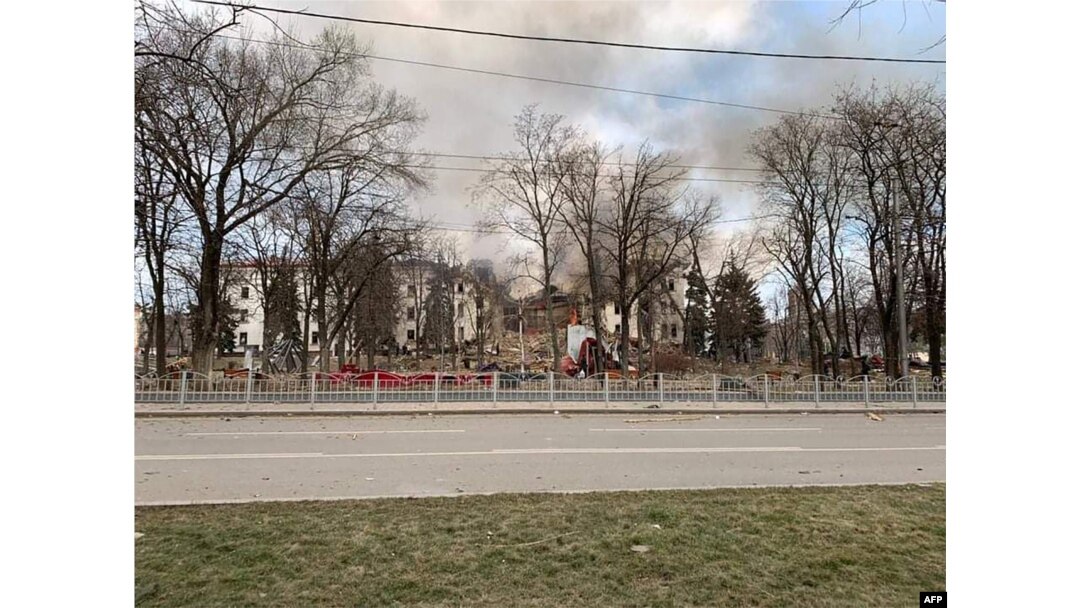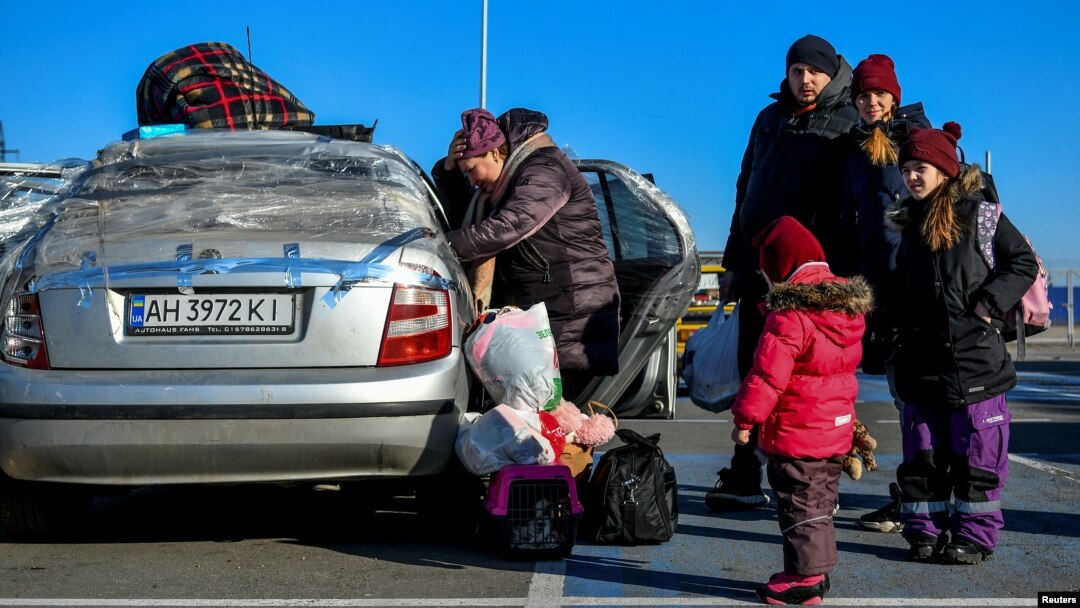A humanitarian corridor in Ukraine’s Luhansk region is opening Saturday to allow people to evacuate the area, according to regional Governor Serhiy Gaiday, who said food will also be available during the evacuation.
“Russia’s invasion of Ukraine has sparked significant rises in energy and food prices,” the Center for Global Development reported Friday. The center said its analysis “suggests the scale of price spike will push over 40 million into extreme poverty.”
“Governments and international agencies will need to act quickly and generously to anticipate and support humanitarian needs—but they should also use the crisis as an opportunity to reform agricultural policies in the EU and US that are undermining food security,” the center said.
On Friday, the United Nations Office for the Coordination of Humanitarian Affairs, or OCHA, said it has delivered “the first convoy of urgent humanitarian aid” to the ravaged northeastern Ukrainian city of Sumy.

This picture published March 16, 2022, on the Telegram account of regional governor Pavlo Kirilenko shows the theater destroyed by shelling in Mariupol. As of March 18, 130 people had been rescued from the theater’s basement, Ukrainian officials said, but
“The 130 metric tons of essential aid includes medical supplies, bottled water, ready-to-eat meals and canned food that will directly help some 35,000 people,” OCHA said. “In addition to these items, the convoy brought equipment to repair water systems to help 50,000 people.”
Ukrainian officials say they have yet to find any casualties in the ruins of a theater hit by a Russian airstrike this week in the southern city of Mariupol as Russian forces continue to fire on Ukrainian cities and negotiators from both countries seek to find common ground.
As of Friday, 130 people had been rescued from the theater's basement, Ukrainian officials said, as the search continues for the hundreds more who could be trapped in the makeshift bomb shelter that was hit Wednesday.
Mariupol's city council said on Telegram that "according to initial information, there are no dead. But there is information about one person gravely wounded."
The theater was bombed despite signs indicating that civilians, including children, were sheltering there. Russia denies striking the theater.
A man removes a destroyed curtain inside a school damaged among other residential buildings in Kyiv, Ukraine, March 18, 2022. Russian forces pressed their assault on Ukrainian cities Friday, with new missile strikes and shelling near Kyiv and Lviv.
Also Friday, Russia's lead negotiator in talks with Ukraine said the sides have moved closer to agreement on the issue of Ukraine dropping its bid to join NATO.
Vladimir Medinsky said Friday the two countries are also "halfway there" on the question of Ukraine adopting neutral status.
Ukrainian negotiator Mykhailo Podolyak said on Twitter, "Our positions are unchanged. Cease-fire, withdrawal of troops & strong security guarantees with concrete formulas."
Ukrainian President Volodymyr Zelenskyy called for comprehensive peace talks with Moscow in a video address released early Saturday.
“The time has come for a meeting, it is time to talk,” he said, adding, “The time has come to restore territorial integrity and justice for Ukraine. Otherwise, Russia's losses will be such that it will take you several generations to recover."
US-China talks
On the diplomatic front, U.S. President Joe Biden and Chinese President Xi Jinping discussed Russia's invasion of Ukraine in a rare videoconference call Friday.
U.S. President Joe Biden holds virtual talks with Chinese President Xi Jinping from the Situation Room at the White House in Washington, March 18, 2022. (The White House/Handout via Reuters).
White House press secretary Jen Psaki said Biden conveyed "very directly, leader to leader, what the implications and consequences would be" if China provided material support to Russia.
"China has to make a decision for themselves about where they want to stand and how they want the history books to look at them and view their actions," she added.
China's Foreign Affairs Ministry said in a statement after the nearly two-hour discussion that "conflict and confrontation" is "not in anyone's interest."
Ministry spokesperson Hua Chunying, however, criticized the U.S. suggestion that China risks being on the wrong side of history, saying the U.S. administration is being "overbearing."
China could play a critical role in the conflict depending on its response to Russia's reported request for military assistance. The United States is providing the bulk of military assistance to Ukraine, with Biden having announced another $800 million defense package this week.
Russia still stalled
The latest British defense intelligence assessment of the conflict is that "Russian forces have made minimal progress this week."
As the invasion enters its fourth week, Russian troops have failed to seize control of Kyiv, a major objective of the Kremlin.
FILE - Russia Ambassador Vassily Nebenzia addresses a meeting of the U.N. Security Council on the humanitarian crisis in Ukraine, March 17, 2022, at U.N. headquarters.
Britain's Defense Ministry tweeted Friday that "Ukrainian forces around Kyiv and Mykolaiv continue to frustrate Russian attempts to encircle the cities."
"The cities of Kharkiv, Chernihiv, Sumy and Mariupol remain encircled and subject to heavy Russian shelling," it said.
U.S. defense officials have repeatedly described Russia's military as facing stiff resistance from Ukrainian forces.
In Moscow, Russian President Vladimir Putin addressed tens of thousands of people at a stadium rally Friday, praising the Russian troops fighting in Ukraine.
"We have not had unity like this for a long time," he said.
"We know what we need to do, how to do it and at what cost. And we will absolutely accomplish all of our plans," he added.
SEE ALSO: Latest Developments in Ukraine: March 19Russia's claims against US
Meanwhile, the U.N. Security Council met Friday at Russia's request for the second time in a week to discuss its latest allegations that the U.S. was operating a secret biological weapons program in Ukraine.
Russian Ambassador Vassily Nebenzia claimed that Russian forces had uncovered new documents during their military offensive, and that Ukraine was playing only a secondary role in the alleged project.
"The Ukrainian specialists were not informed about the potential risks of transfer of biological materials and were kept in the dark," Nebenzia said of the allegedly secret military biological program. "They don't have a real idea about the real objectives of the research being carried out."
U.S. envoy Linda Thomas-Greenfield dismissed the earlier allegations as "bizarre conspiracy theories" and said the latest claims sounded like they came from "some dark corner of the internet."
She expressed Washington's continued concern that Moscow may be planting the seeds for an attack it would then blame on Ukraine.
"We continue to believe it is possible that Russia may be planning to use chemical or biological agents against the Ukrainian people," Thomas-Greenfield said.
The United Nations human rights office said Friday it has verified 816 civilian killings since the fighting began Feb. 24 but believes the death toll is vastly understated. Ukrainian officials say thousands of civilians have been killed.
Nearly 3.3 million people have fled the war in Ukraine, according to U.N. estimates.
The U.N. migration agency said Friday that in addition to those who have left the country, nearly 6.5 million people have been displaced inside Ukraine and that another 12 million people have been stranded or unable to leave parts of Ukraine because of heightened security risks or a lack of resources.
The U.N. Office for the Coordination of Humanitarian Affairs said, "By these estimates, roughly half the country is either internally displaced, stranded in affected areas or unable to leave, or has already fled to neighboring countries."
VOA's White House bureau chief Patsy Widakuswara, congressional correspondent Katherine Gypson and U.N. correspondent Margaret Besheer contributed to this report.
Some information also came from The Associated Press, Agence France-Presse and Reuters.
Some information also came from The Associated Press, Agence France-Presse and Reuters.


